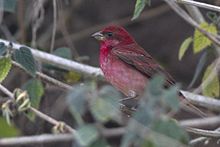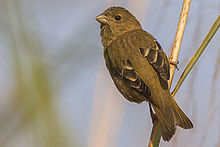Common rosefinch
| Common rosefinch | |
|---|---|
 |
|
| Male from Neora Valley National Park, West Bengal, India | |
 |
|
| Female at Baur reservoir in Uttarakhand, India | |
| Scientific classification | |
| Kingdom: | Animalia |
| Phylum: | Chordata |
| Class: | Aves |
| Order: | Passeriformes |
| Family: | Fringillidae |
| Subfamily: | Carduelinae |
| Genus: | Carpodacus |
| Species: | C. erythrinus |
| Binomial name | |
|
Carpodacus erythrinus (Pallas, 1770) |
|
 |
|
| Distribution map | |
| Synonyms | |
|
Erythrina erythrina |
|
Erythrina erythrina
The common rosefinch (Carpodacus erythrinus) or scarlet rosefinch is the most widespread and common rosefinch of Asia and Europe.
In a molecular phylogenetic study of the finch family published in 2012, Zuccon and colleagues found that the common rosefinch fell outside the core Carpodacus rosefinch clade and was a sister to the scarlet finch (at the time Haematospiza sipahi). They recommended that the common rosefinch should be moved to a new monotypic genus with the resurrected name of Erythrina. The British Ornithologists' Union accepted this proposal, but the International Ornithological Union chose instead to adopt a more inclusive Carpodacus that retained the common rosefinch in the rosefinch genus.
The genus name is from Ancient Greek karpos, "fruit" and dakno, "to bite", and the specific erythrinus is from Latin erythros, "red".
The common rosefinch is 13–15 cm (5.1–5.9 in) in length. It has a stout and conical bill. The mature male has brilliant rosy-carmine head, breast and rump; heavy bill; dark brown wings with two indistinct bars, and a white belly. Females and young males are dull-colored with yellowish-brown above, brighter on the rump and greyer on head; buff below.
Adults moult in their winter quarters, between September and November. After moulting the red of male is subdued, and becomes brighter during the winter due to wear of the feathers.
It has spread westward through Europe in recent decades, even breeding in England once. Common rosefinches breed from the Danube valley, Sweden, and Siberia to the Bering Sea; the Caucasus, northern Iran and Afghanistan, the western Himalayas, Tibet and China; to Japan between latitudes 25° and 68°. In winter they are found from southern Iran to south-east China India, Burma, and Indochina.
...
Wikipedia

